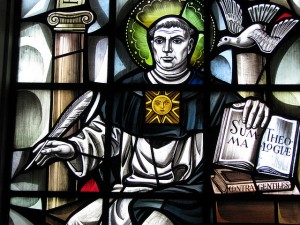
In the past, the Catholic Church was well positioned to favor excellent nutrition to the faithful. Through its liturgical feast days, a wonderful rhythmic ebb and flow of life adapted well to our nature.
In the sixteenth and seventeenth centuries, for example, the peasants followed a good and simple diet and a lifestyle that had many mandatory fasts scheduled by the Catholic Church that matched the liturgical themes of the Church calendar (Bokenkotter, 2004). These fasts created a needed detachment from food.
A Balanced Life with Great Meaning
This order and rhythm changed with the seasons and Church feasts. Monasteries, during the early Middle Ages, provided examples of the impact of these rhythms on health, physical fitness and intellectual development. The monks followed a life of balance between physical work, spiritual readings and prayer that was central to the life of the community.
This order provided the opportunity to cultivate a life of purpose rooted in deep joy and meaning, which invariably translated into good health and longevity. The secret to solving obesity today is indeed a deepening of the interior life. When monks and priests served as models for society, they conveyed an idea of what it meant to be selfless, loving and therefore healthy. The declining numbers of religious and priests today has disrupted the social order by creating a vacuum of sorts that has been filled by secular heroes which reflect more of a narcissistic and therefore unhealthy hue.
A Life Anchored in the Cardinal Virtues
In the book, Return to Order, author John Horvat advances that this order is important for societal growth, and must be based “on the four cardinal virtues—prudence, justice, fortitude, and temperance—since they are the moral virtues upon which all other virtues are hinged and which specifically regulate man’s use of material things.”
This organic rhythm, solidly anchored on the high moral ground of virtue and Christian perfection, is missing in today’s frenetic lifestyle (Horvat, 2013). That is why the Catholic Church is well positioned to provide solution. The Church teaches this order and the rhythm of life so desperately needed for the development of an interior life.
What Does Saint Thomas Say About Immigration?
Swept Away by a Frenetic Culture
Our culture has been swept away by the allures of happiness, excitement, self-empowerment and accomplishments. As a result, we long for foods that have been calculated to deliver bliss points. We relish the limelight and the runner’s high. We yearn for self-actualization in our work. All this leads to a situation in which we no longer follow the ebb and flow that is so innately attached to our nature, which is naturally ordered to seek God.
Once this balance and order are missing in a person’s life and society at large, incalculable consequences begin to occur. It begins with stress and anxiety (which invariably leads to disease) and ultimately to an obesity crisis that is crippling our nation and possibly fueling its demise.
In the end, the dazzling lights, tasteful foods, and sexual pleasures cannot satiate those deep appetites of the soul. People find restlessness instead. Indeed, the links between obesity and depression are hardly surprising. This same restlessness fuels extreme sports, extreme work hours, extreme partying and extreme eating. And while we ardently follow our narcissistic drive towards self-actualization and self-empowerment, we neglect to cultivate in ourselves humility, purity of heart and temperance.
The Church’s Role in This Fight
The Catholic Church can address all these issues and therefore aid in the fight against obesity. The Church teaches that humility is the virtue around which all the virtues gravitate. The rich mystical life of the Catholic Church teaches also, through writers like Fr. Jean-Pierre de Caussade, that rather than empower the human soul, Our Lord Jesus Christ, when He approaches, “weakens the soul” in the sense that He teaches us simplicity not complexity. He fosters child-like purity and beauty, not prideful and powerful posturing.
What does Saint Thomas Aquinas say about Marriage?
The Sacraments are instrumental at breaking our pride, and recognizing the Kingship of Jesus Christ. However, they can only be effective if priests ensure that catechetical teachings of the parish youth espouse purity and humility foremost, because the culture is especially virulent at destroying these first in our youth. Once purity and humility are corrupted, fidelity to the Sacraments is next to impossible to maintain.
When these virtues are fortified, then the four cardinal virtues—prudence, justice, fortitude, and temperance—can be easily taught. With the help of grace, the battle against obesity can then be fought with success.
[like url=https://www.facebook.com/ReturnToOrder.org]
Dr. David Bissonnette is an Associate Professor of Nutrition at Minnesota State University, Mankato where he does obesity research. He advances that obesity is a mere symptom of a much greater social malaise which medical science has failed to address. He is author of two textbooks: It’s All About Nutrition and Nutrition for Healthcare Professionals. He has produced documentaries and manages the web site: The Nutrition Report.
❮ Previous Article in this Series |
Next Article in this Series ❯ |


